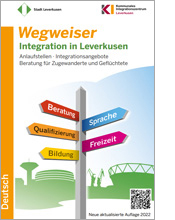Under certain conditions, foreign school, vocational and degree qualifications can be recognised in Germany. It depends on the particular profession whether recognition is possible or necessary, and the procedure involved and body responsible for recognising the qualifications may also vary. You will find information here on the recognition procedures and the most important advice centres and online guides in this regard:
Personal advice
JOB Service Beschäftigungsförderung Leverkusen gGmbH
Advice on recognition, open to all
Gerichtsstraße 10, 51379 Leverkusen, Room 206 (2nd floor)
Every Thursday from 9 am to 12 pm (no appointment necessary)
Claudia Welke
Phone: 02171/ 947425
Email:
Caritasverband Leverkusen e.V., Fachdienst Integration und Migration (Special Service for Integration and Migration)
Vocational guidance and advice on integration into the labour market (with advice on recognition)
Bergische Landstraße 86, 51375 Leverkusen
Maximilian John, Dominik Kramm
Phone: 0214/ 855 42 610
Email:
Online guides
Click through to find out which professions in Germany can be recognised and how the procedure works:
www.anerkennung-in-deutschland.de
anabin: Infoportal zu ausländischen Bildungsabschlüssen
Responsibilities and recognition procedures
The procedure for recognising professional qualifications
Generally speaking, a recognition procedure consists of several steps.
Under the recognition finder (Anerkennungsfinder) on the www.anerkennung-in-Deutschland.de portal, you can enter the profession for which recognition is needed and find out which body is responsible for this. The recognition finder details the steps needed to gain recognition and provides other useful information.
If you wish to have your foreign qualifications recognised, it is worth first consulting with an adviser at one of the free advice centres of the Integration durch Qualifizierung (IQ) (integration through qualification) support programme. They can answer your questions and give you valuable information on the documents required and the recognition procedure for the respective profession.
Find a free advice centre near you
www.anerkennung-in-deutschland.de/html/de/beratungsstellen_iq_netzwerk
The "Arbeiten und Leben in Deutschland" (working and living in Germany) hotline of the Federal Office for Migration and Refugees (BAMF) offers advice over the phone from Monday to Friday at +49 30 1815 1111.
Further information on the recognition procedure:
www.anerkennung-in-deutschland.de/tools/berater/de
The recognition procedure for school qualifications
School qualifications obtained abroad can be recognised in Germany under certain conditions. You can find information on the procedure for recognising foreign certificates and the relevant responsibilities on the website of the Ministry of Schools and Education of the state of North Rhine-Westphalia:
www.schulministerium.nrw/
The district government of Cologne is responsible for the recognition of qualifications up to the intermediate school certificate (Fachoberschulreife), i.e. first school certificate (formerly Hauptschulabschluss after grade 9), extended first school certificate (formerly Hauptschulabschluss after grade 10) and intermediate school certificate (Fachoberschulreife). Further information can be found here:
www.bezreg-koeln.nrw.de
Recognition of the Fachhochschulreife and Allgemeine Hochschulreife ((Fach-) Abitur) is carried out by the Certificate Recognition Office of the Düsseldorf District Government (Department 48). Further information can be found here:
Anerkennung ausländischer Bildungsnachweise | Bezirksregierung Düsseldorf (nrw.de)
Training
In some professional areas, people who do not have any or sufficient vocational or academic qualifications or do not yet have a suitable command of German can undergo further training to enhance their skills. We list some such programmes here:
IQ NRW – OnTOP|THK: training programme for immigrant academics in NRW – focus on social work and childhood education
The programme includes workshops and coaching on specialist topics in social work and childhood education as well as a mentoring and training programme that gives participants the opportunity to familiarise themselves with different fields of work and connect with practitioners. Participants can also improve their general and specialist German skills in an integrated and specific language course.
Further information on the programme and admission requirements can be found in the flyer and at
The programme is a sub-project of the Integration durch Qualifizierung (integration through qualification) support programme.
If you have questions, please contact:
TH Köln
Stefanie Vogt, Anna Zuhr
Email:
Phone: 0221/ 8275-3688
IQ Fachstelle Beratung und Qualifizierung (competence centre offering advice and training): virtual training for migrant academics
IQ Fachstelle offers what are called virtual bridge training schemes for people from migrant backgrounds with a foreign university degree in psychology or the humanities and social sciences.
The training courses combine virtual classes, self-learning and classroom activities. The goal is to improve professional German language skills and support a successful transition to the German labour market by providing specialist content.
Participation in the courses is free.
The requirements and qualifying conditions for the training courses can be viewed on the website. Registration is now open via the following link:
www.netzwerk-iq.de/berufliche-anerkennung/angebote/virtuelle-qualifizierung.html
Ausbildungs- & Arbeitsperspektive (training and work prospects) IHK programme
The IHK-Stiftung für Ausbildungsreife und Fachkräftesicherung (IHK foundation for training readiness and securing skilled workers) is continuing its successful Ausbildungs- & ArbeitsPerspektive programme. The programme helps refugees with integration into the labour and training market through various modules in the form of seminars and workshops. The modules cover a range of topics, including vocational guidance, application training and soft skills. Further information is available here:
Ausbildungs- und Arbeitsperspektive




